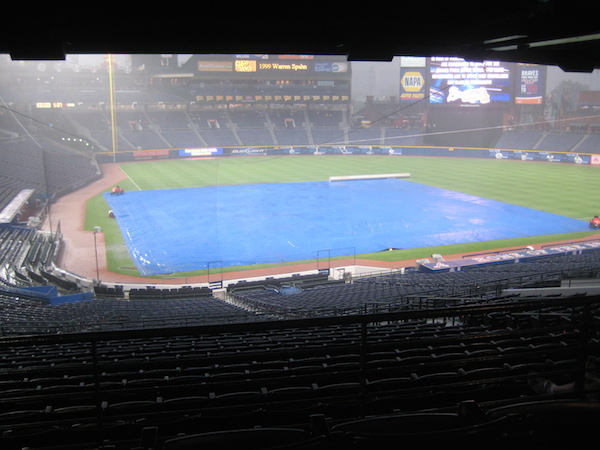Dear Sports Fan,
Why did the Red Sox game on Marathon Monday stop early? Isn’t that unfair? Who gets to choose when they’re stopping? How does it work in baseball when a game is called part of the way through?
Thanks,
Bobbie
Dear Bobbie,
It’s true, the game on Patriots’ Day in Boston between the Red Sox and the Baltimore Orioles ended in less than the full nine innings. It was stopped by the umpire in the middle of the seventh inning because of rain. The game was not restarted, nor will it be finished at a later date. In baseball, it’s okay to have a game that’s less than nine innings and its result counts towards the final standings just as much as if it had been played all the way through. When this happens, it’s usually because of weather, but there are other permissible reasons. This may seem weird to you but it’s all part of baseball’s unique structure and culture.
If you want to understand the exact rules that govern when and why a baseball game can be stopped, your first stop might be the official rules of the game. The problem with this is that these rules appear to have been written by a mixture of lawyers and spies. You need an expensive education and a one-time pad just to make sense of them. Here’s an example:
No game called because of a curfew (Rule 4.12(a)(1)), weather (Rule 4.12(a)(5)), a time limit (Rule 4.12(a)(2)) or with a tied score (Rule 4.12(a)(6)) shall be a suspended game unless it has progressed far enough to have been a regulation game pursuant to Rule 4.10(c). A game called pursuant to Rules 4.12(a)(3) or 4.12(a)(4) shall be a suspended game at any time after it starts.
For mere mortals like us, it’s probably enough to know a simplified version of these rules. This information will serve 95% of time.
- Once the game starts, the only person who gets to choose if and when to stop the game is the head umpire.
- A game can be stopped temporarily, usually for rain, and can be restarted once the conditions allow play again.
- If a game has to be stopped for the day, it is declared a “called” game and this is when the mildly complicated stuff starts.
- If a game is called before four and a half innings are played, the game is declared not to have existed at all and the teams need to reschedule it and start from the beginning. All of the statistics accumulated in the game are stricken from the record. Let’s take a minute to think about how totally insane that would feel as a player. You’re having a great game — the best of your life. You’ve got two home runs in the first three innings. Then it starts raining and they’re just gone. Of course, a bad game of fielding errors could just as easily be wiped from the books, so maybe it works out. Rany Jazayerli has a great article about this in Baseball Prospectus. He notes that Roger Maris, who held the single season home run record with 61 for decades, actually would have had 62 but for one being erased in this way.
- If a game has reached four and a half inning and the home team is winning (and therefore nothing that happens in the bottom of the fifth inning, when the home team is up to bat, could change the outcome,) the game is over and it counts as a regulation game.
- If a game has reached the four and a half inning mark and it is tied, the game will become a suspended game. It must be rescheduled and when play starts, it will pick up right where the two teams left off, although some player substitutions are allowed.
Weather is by far the most common reason for calling a game, but the rules allow for light or other technical malfunctions, “a curfew imposed by law” and the mysterious “a time limit permissible by league rules.” As far as I can tell, the rules that the rules are referring to here, do not exist.
With all the money and competitive importance involved in professional sports today, these rules may seem archaic or even irresponsibly lighthearted. They seem to suggest that the outcome of a game is not so important, that once the game is half through, that’s enough to call it done. This ignores a thousand late-inning comebacks. The thing is, baseball is a little bit archaic and that’s part of its nostalgic charm. It is more relaxed than other sports. The length of the regular season (162 games) means that each game actually does mean less. Compared to an NFL football season of 16 games, each baseball game is only 1/16 as important as each NFL football game. Part of what makes baseball fun to follow is its every-day, low-key rhythm. Being calm enough about a sport to accept a loss even though you were only down by one run in the fifth inning when it started to rain is emblematic of what baseball fans love about their sport.
Thanks for reading,
Ezra Fischer


Nice article, Thank you. The time limit used to exist back in a time before all stadiums had lights for night play.